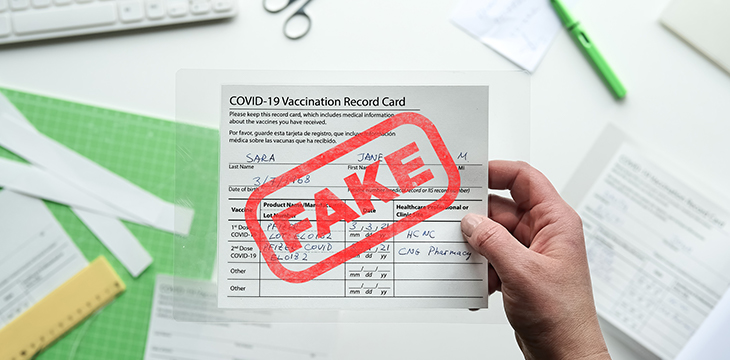|
Getting your Trinity Audio player ready...
|
Vaccination against COVID-19 has become critical across the world, and with this has sprung up a thriving underground market for fake vaccination certificates. The latest country to sound the alarm on this vice is Australia. Fake certificates in the country are going for as low as $13, with vendors touting extra perks for their clients as the trade gets competitive. Experts in Australia are calling for the application of blockchain which they believe holds the solution.
In its report, local newspaper The Australian took a dive into the world of fake vaccination certificates. It cited some of the vendors who told the paper that they had sold over 200 certs for $120 or more each. More worryingly, they claimed to have orders and interests from over 900 other clients.
The vendors told the paper that in some of their adverts, they claim that their certs are so convincing that “you’ll be the only one to know you’ve not been vaccinated.” For a little extra fee, the vendors claim to be able to have doctors log in falsified vaccination records in the country’s Immunization Registry.
The fake vaccination certificates business is thriving in Australia, as it is in countries like the U.S. and the U.K. A report by cybersecurity firm Check Point revealed that there has been an exponential growth in this market. Telegram has become the predominant way to sell such certs, with some Telegram groups having more than 450,000 members.
Blockchain can be the solution to this quickly evolving challenge, experts in Australia believe. Robert Potter, the founder of Internet 2.0 cybersecurity firm called on Aussie authorities to implement blockchain systems to curb the fake certificates challenge.
He told the paper, “We can come up with a foolproof system that only we can use, but we actually need a global system that everyone can use. It would be the cryptographic equivalent of a hologram.”
Blockchain technology has been tested in the securing of COVID-19 vaccination data in various countries globally. In Lesotho, the BSV blockchain is helping the country respond to the pandemic and reignite the economy of the Southern African nation. BSV startup VXPASS has partnered with the SESIU Fund, which has been working in COVID-19 vaccination in Lesotho, to bring vaccine cards and other logistics on-chain.
“VXPASS is providing a replacement for the common paper COVID card with a secure, digital, patient-owned version,” founder Zachary Weiner told CoinGeek.
In Australia, Bitcoin SV could provide a tamper-proof solution to the budding problem. The country’s Senate already has extensive materials on the BSV blockchain network, including what makes it unique from BTC and other blockchains. This is after Aussie company Elas Digital submitted a 14-page report to the Senate on BSV’s capabilities and its position in the technology world.
Elas recently submitted a response to the 3rd issues paper for the Australian Senate's Select Committee on Australia as a Technology and Financial Centre.
You can read our submission here: https://t.co/vARS9wwQ68
And get more info/other submissions here: https://t.co/vjb3ZzwSGL
— Elas (@elas_co) July 14, 2021
Watch: CoinGeek Zurich panel, Health Care & Blockchain: Empowering Patient Data

 03-01-2026
03-01-2026 




